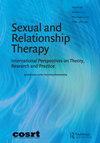治疗师对来访者关于感知焦点练习的反馈的使用:对治疗师观点的解释性描述
IF 1.4
4区 心理学
Q3 PSYCHOLOGY, CLINICAL
引用次数: 0
摘要
【摘要】感觉焦点是性心理治疗的核心部分,但在许多方面还有待研究。一项文献综述发现了研究中的空白,包括:从业者在寻求反馈时如何使用语言,特别是关于感觉和愉悦的反馈,以及他们如何帮助客户处理SF练习引起的特定干扰和障碍。本研究采用莎莉·索恩的解释性描述方法论,采用社会建构主义认识论和解释性理论视角。采用有目的的抽样方法选取7名治疗师,并参与半结构化访谈,采用模板分析法进行分析。结果确定了两种处理反馈的一般方法,即“以触摸为中心”的反馈和“广泛的”反馈,尽管它们的区别是强调的而不是严格的界限。治疗师们也对询问来访者在SF练习中的愉悦体验的价值存在分歧。在处理分心和障碍的技术种类和正念应用的程度上发现了差异。他们提出的建议包括提高正念在培训课程中的地位,更加强调在感官集中练习后客户的笔记记录,以及进一步研究治疗师在处理反馈时使用的语言的必要性。摘要:本研究旨在帮助性心理治疗师更好地理解如何处理来访者关于感知焦点练习的反馈。建议包括在培训课程中更加强调正念的教学,并鼓励客户在练习后做书面笔记,告知他们与治疗师的反馈。致谢致谢致谢致谢致谢致谢致谢致谢致谢致谢致谢致谢致谢致谢致谢致谢致谢致谢致谢致谢致谢致谢致谢致谢致谢致谢致谢致谢致谢致谢致谢致谢致谢致谢致谢致谢致谢致谢致谢致谢致谢致谢致谢致谢致谢致谢致谢致谢致谢致谢致谢致谢致谢致谢致谢致谢致谢致谢致谢致谢致谢不幸的是,彼得在研究完成后不久就去世了。我还要感谢Sally Thorne对使用解释性描述方法的鼓励反馈。也感谢治疗师们慷慨地为这项研究付出了时间。披露声明作者未报告潜在的利益冲突。本文章由计算机程序翻译,如有差异,请以英文原文为准。
Therapists’ use of feedback from clients about Sensate Focus exercises: an interpretive description of therapists’ perspectives
AbstractSensate Focus (SF) forms a core part of psychosexual therapy (PST) but in many respects is under researched. A literature review identified gaps in research including: how practitioners use language when asking for feedback, in particular about sensations and pleasure, and how they help clients deal with specific distractions and blockages arising from SF exercises. Sally Thorne’s Interpretative Description methodology was used for this study, using a social constructionist epistemology and interpretive theoretical perspective. Seven therapists were selected using purposive sampling and participated in semi-structured interviews, analysed using Template Analysis. The results identified two general approaches to dealing with feedback, characterised as “touch-centred” feedback and “broad-based” feedback, though the differences are ones of emphasis rather than a strict demarcation. Therapists are also divided about the value of asking clients about their experience of pleasure in SF exercises. Differences were found in the kinds of techniques used to address distractions and blockages and the extent to which Mindfulness is applied. Recommendations made relate to raising the profile of Mindfulness in training courses, giving greater emphasis to client note-taking after sensate focus exercises, and the need for further research into the language used by therapists when dealing with feedback.LAY SUMMARYThis research was designed to help psychosexual therapists develop a greater understanding of how to process feedback from clients about Sensate Focus exercises. Recommendations include a greater emphasis on teaching Mindfulness in training courses and encouraging clients to make written notes after exercises to inform their feedback with the therapist.Keywords: Sensate focuspleasuredistractions AcknowledgmentsI would like to thank Peter Cardew, my supervisor, for his advice, support, and patience as I navigated my way through this research. Sadly, Peter passed away soon after the research was completed. I would also like to thank Sally Thorne for her encouraging feedback about using the Interpretive Description methodology. Thanks also to the therapists who generously gave their time for this research.Disclosure statementNo potential conflict of interest was reported by the author(s).
求助全文
通过发布文献求助,成功后即可免费获取论文全文。
去求助
来源期刊

Sexual and Relationship Therapy
PSYCHOLOGY, CLINICAL-
CiteScore
3.80
自引率
9.10%
发文量
37
期刊介绍:
Sexual and Relationship Therapy is a leading independent journal in its field, well established and internationally recognized. It offers an active, multidisciplinary forum for review and debate across the spectrum of sexual and relationship dysfunctions and therapies. The journal presents original research and best practice and is a vehicle for new theory, methodology, and application. Sexual and Relationship Therapy is edited by a respected international team and publishes contributions from around the world. It is the official journal of the British Association for Sexual and Relationship Therapy (BASRT).
 求助内容:
求助内容: 应助结果提醒方式:
应助结果提醒方式:


